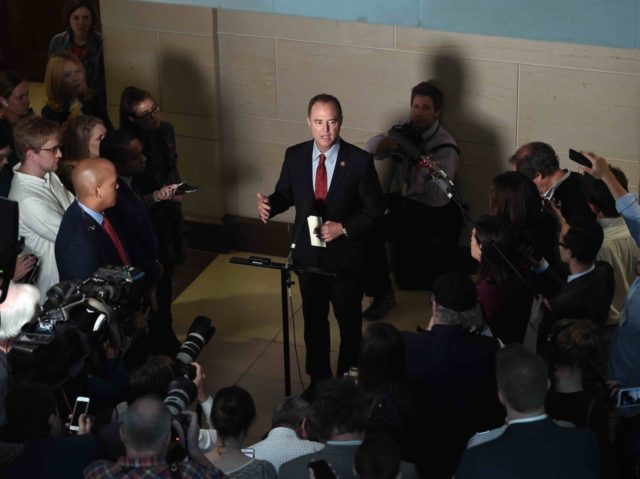Democrats on the House Intelligence Committee have been releasing transcripts of depositions with witnesses in the “impeachment inquiry” this week — along with abridged versions that highlight only what they want reporters to know.
The “Cliff’s Notes” versions download more quickly than the full transcripts — which are large and unwieldy files, and are often unavailable in any case, as the House Intelligence Committee website appears to be overloaded.
The Democrats’ abridged versions are also shorter, and are arranged like legal briefs. Quotes are not provided in the order they were given, but in the order that Democrats feel best helps them make the case for impeachment. Each quote is preceded by a boldface section that states the Democrats’ own conclusions before the text itself appears.
For example, the transcript of the deposition of diplomat William Taylor — whom the Democrats apparently consider their strongest witness — is hundreds of pages long, but the “Cliff’s Notes” version is just 13 pages.
It begins with a highlighted quote on the cover page, which is Taylor’s statement that he had a “clear understanding” that “security assistance money would not come until the President [of Ukraine] committed to pursue the investigation.”
That claim of a “clear understanding” was widely cited by the media as evidence that there was, in fact, a “quid pro quo” in President Donald Trump’s request that Ukraine investigate allegations against former Vice President Joe Biden and his son, Hunter Biden, who served on the board of Burisma, a controversial Ukrainian firm.
However, the transcript omits the key exchange between Taylor and Rep. Lee Zeldin (R-NY), in which Taylor admits that he had not talked to President Trump and his only source of information was the New York Times:
Zeldin: What was the goal of requesting investigations into 2016 election and [Ukrainian company that employed Hunter] Burisma?
Taylor: As I understand it from one of the maybe the article in the New York Times about [Trump’s private lawyer] Mr. [Rudy] Giuliani’s interest in Burisma, in that article, he describes, and I think he quotes Giuliani at some length, that article indicates that Giuliani was interested in getting some information on Vice President Biden that would be useful to Mr.Giuliani’s client. I think that’s what he says. He says he’s got one client, and he’s useful to the client.
Zeldin: And then it’s your inference that Mr. Giuliani’s goal would be the President’s goal?
Taylor: Yes.
Zeldin: And your source is the New York Times?
Taylor: Yes.
Zeldin: So do you have any other source that the President’s goal in making this request was anything other than the New York Times?
Taylor: I have not talked to the president. I have no other information from what the President was thinking.
The most important line — “I have not talked to the president” — does not appear in the Democrats’ short version.
In addition, the Cliff’s Notes version leaves out Taylor’s admission, under questioning from Rep. John Ratcliffe (R-TX), that “nobody in the Ukrainian Government was aware” of any suspension of aid, making a “quid pro quo” impossible.
It also omits Taylor’s acknowledgment that Trump’s policy on Ukraine was an “improvement” on that of President Barack Obama, who denied Ukraine “lethal” military aid, including Javelin anti-tank missiles, against Russia.
That explains why the mainstream media and conservative media are reporting such different conclusions about Taylor’s deposition. The mainstream media rushed to press with the Democrats’ “Cliff’s Notes,” which left out information that contradicted Democrats’ assertions.
Conservative media tended to read the full document as well, which meant they often responded more slowly to the release of the transcript, but reported it more accurately.
Joel B. Pollak is Senior Editor-at-Large at Breitbart News. He earned an A.B. in Social Studies and Environmental Science and Public Policy from Harvard College, and a J.D. from Harvard Law School. He is a winner of the 2018 Robert Novak Journalism Alumni Fellowship. He is also the co-author of How Trump Won: The Inside Story of a Revolution, which is available from Regnery. Follow him on Twitter at @joelpollak.

COMMENTS
Please let us know if you're having issues with commenting.